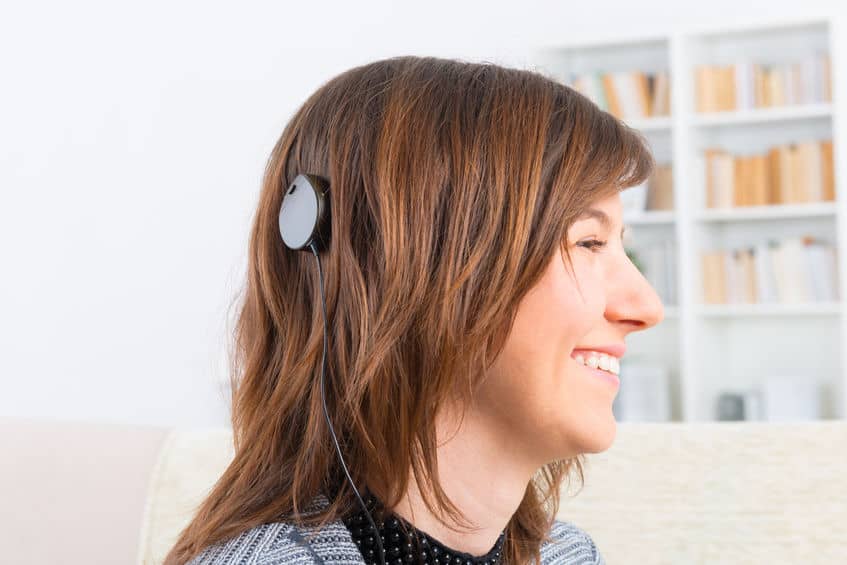
While most people with hearing loss have success with hearing aids, there are some people with severe to profound hearing loss for whom hearing aids are not beneficial. For these people, a cochlear (koe-klee-er) implant may be the best option for better hearing.
What are cochlear implants?
Cochlear implants are tiny electrical devices that are designed to help those with a sensorineural hearing loss. This means that the hair cells in the inner ear are damaged and cannot send sounds to the auditory nerve. A cochlear implant bypasses the hair cells and sends sounds directly to the nerve.
A cochlear implant can help people with severe hearing loss. It allows them to take in information through the auditory nerve, which allows the brain to notice the incoming sounds. Cochlear implants do not cure hearing, but they do provide an opportunity for the severely hard of hearing or deaf to perceive the sensation of sound by bypassing the damaged inner ear.
How do cochlear implants work?
Cochlear implants work in a much different way than hearing aids. Rather than amplifying sound like a hearing aid, a cochlear implant provides the sensation of sound by stimulating the auditory nerve directly.
A cochlear implant uses two parts, one external and one internal.
The external, or outside, component of cochlear implants consists of three parts: a microphone, a speech processor, and a transmitter. The microphone and speech processor are housed in a device that rests behind the ear like a hearing aid. A small wire usually connects them to the transmitter, which is positioned over the internal part of the device with the use of a magnet.
The microphone picks up sounds and sends them to a speech processor. The speech processor turns the sounds into digital signals, which are sent to a transmitter. The transmitter then sends the signal to the internal receiver.
The internal, or inside, part is called a receiver. This is surgically implanted under the skin behind the ear. It sends signals to electrodes in the inner ear. This allows the brain to notice the incoming sounds, allowing the user to perceive the sensation of sounds.
Who can benefit from cochlear implants?
Cochlear implants are approved by the FDA for use with both children and adults. Although candidacy for cochlear implants is usually on a case-by-case basis, in general, candidacy guidelines include the following from American Speech-Language-Hearing Association:
Adults:
• Have severe or profound hearing loss in both ears
• Have no medical problems that would make surgery risky
• Get little or no benefit from hearing aids
• Have a desire to be active in treatment to work on language skills and to be part of the hearing world
Cochlear implants work best with adults who were able to acquire language skills before losing hearing (postlingually deafened), but adults who did not develop spoken language skills before losing hearing (prelingually deafened) may still be candidates. The success of a cochlear implant lies a great deal in the user’s participation in speech and language therapy. A user will see much better results if he or she is actively participating in therapy and putting forth effort.
Children:
• Have severe or profound hearing loss in both ears
• Have no medical problems that would make surgery risky
• Get little or no benefit from hearing aids
• Have support from an education program that will help them learn auditory and language skills
Children as young as 12 months old may be eligible for a cochlear implant. Experts recommend implantation as early as possible for children who meet these criteria to help them during the critical period of language acquisition skills. After implantation, they must undergo intense speech and language therapy to help them achieve the best possible outcome from the implant.
Many experts suggest that nothing is more important than realizing the full benefits to cochlear implants than auditory rehabilitation therapy. Auditory rehabilitation utilizes structured activities that should be carried over into real life to optimize the use of the new signal. The involvement of family and friends in the therapeutic process greatly enhances results.
Where can I find additional information about cochlear implants?
If you think that you or a loved one could benefit from a cochlear implant, talk to an ENT or audiologist. You can contact the implant audiologist at Whisper Hearing Centers, Julie Bower, at (317)962-5690 for cochlear implant-related questions. All cochlear implant audiology appointments are conveniently performed at our IU Health Methodist Hospital location in downtown Indianapolis.
Connect with us on Facebook, submit this online contact form, or give us a call at (317)865-2337 to see how we can help you.
